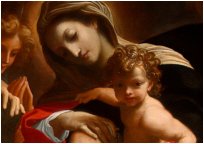Q. 180. What does "unity," and what does "trinity" mean?
A. "Unity" means being one, and "trinity" means three-fold or three in one.
Q. 181. Can we find an example to fully illustrate the mystery of the Blessed Trinity?
A. We cannot find an example to fully illustrate the mystery of the Blessed Trinity, because the mysteries of our holy religion are beyond comparison.
Q. 182. Is there but one God?
A. Yes; there is but one God.
Q. 183. Why can there be but one God?
A. There can be but one God because God, being supreme and infinite, cannot have an equal.
Q. 184. What does "supreme" mean?
A. "Supreme" means the highest in authority; also the most excellent or greatest possible in anything. Thus in all things God is supreme, and in the Church the Pope is supreme.
Q. 185. When are two persons said to be equal?
A. Two persons are said to be equal when one is in no way greater than or inferior to the other.
Q. 186. How many persons are there in God?
A. In God there are three Divine persons, really distinct, and equal in all things --the Father, the Son, and the Holy Ghost.
Q. 187. What do "divine" and "distinct" mean?
A. "Divine" means pertaining to God, and "distinct" means separate; that is, not confounded or mixed with any other thing.
Q. 188. Is the Father God?
A. The Father is God and the first Person of the Blessed Trinity.
Q. 189. Is the Son God?
A. The Son is God and the second Person of the Blessed Trinity.
Q. 190. Is the Holy Ghost God?
A. The Holy Ghost is God and the third Person of the Blessed Trinity.
Q. 191. Do "first," "second," and "third" with regard to the persons of the Blessed Trinity mean that one person existed before the other or that one is greater than the other?
A. "First," "second," and "third" with regard to the persons of the Blessed Trinity do not mean that one person was before the other or that one is greater than the other; for all the persons of the Trinity are eternal and equal in every respect. These numbers are used to mark the distinction between the persons, and they show the order in which the one proceeded from the other.
Q. 192. What do you mean by the Blessed Trinity?
A. By the Blessed Trinity I mean one God in three Divine Persons.
Q. 193. Are the three Divine Persons equal in all things?
A. The three Divine Persons are equal in all things.
Q. 194. Are the three Divine Persons one and the same God?
A. The three Divine Persons are one and the same God, having one and the same Divine nature and substance.
Q. 195. What do we mean by the "nature" and "substance" of a thing?
A. By the "nature" of a thing we mean the combination of all the qualities that make the thing what it is. By the "substance" of a thing we mean the part that never changes, and which cannot be changed without destroying the nature of the thing.
Q. 196. Can we fully understand how the three Divine Persons are one and the same God?
A. We cannot fully understand how the three Divine Persons are one and the same God, because this is a mystery.
Q. 197. What is a mystery?
A. A mystery is a truth which we cannot fully understand.
Q. 198. Is every truth which we cannot understand a mystery?
A. Every truth which we cannot understand is not a mystery; but every revealed truth which no one can understand is a mystery.
Q. 199. Should we believe truths which we cannot understand?
A. We should and often do believe truths which we cannot understand when we have proof of their existence.
Q. 200. Give an example of truths which all believe, though many do not understand them.
A. All believe that the earth is round and moving, though many do not understand it. All believe that a seed planted in the ground will produce a flower or tree often with more than a thousand other seeds equal to itself, though many cannot understand how this is done.
Q. 201. Why must a divine religion have mysteries?
A. A divine religion must have mysteries because it must have supernatural truths and God Himself must teach them. A religion that has only natural truths, such as man can know by reason alone, fully understand and teach, is only a human religion.
Q. 202. Why does God require us to believe mysteries?
A. God requires us to believe mysteries that we may submit our understanding to Him.
Q. 203. By what form of prayer do we praise the Holy Trinity?
A. We praise the Holy Trinity by a form of prayer called the Doxology, which has come down to us almost from the time of the Apostles.
Q. 204. Say the Doxology.
A. The Doxology is: "Glory be to the Father, and to the Son, and to the Holy Ghost. As it was in the beginning, is now, and ever shall be, world without end. Amen."
Q. 205. Is there any other form of the Doxology?
A. There is another form of the Doxology, which is said in the celebration of the Mass. It is called the "Gloria in excelsis" or "Glory be to God on high," etc., the words sung by the Angels at the birth of Our Lord.

